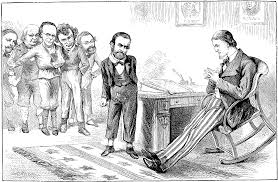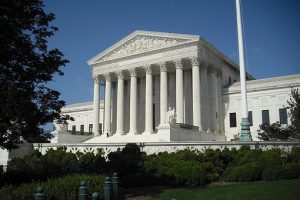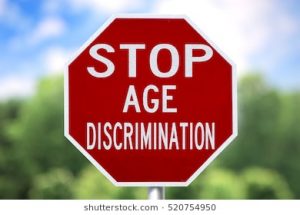Background on the Development and Reasons Behind New Jersey’s Civil Service System
There are many people who complain that Civil Service is a terrible hindrance to efficient government. Managers complain that Civil  Service rules hinder their ability to run their organizations by hiring, firing and imposing discipline as they believe is best. Citizens often complain Civil Service makes it too hard to get rid of “bad apples.” Employees complain that Civil Service makes promotions and transfers too difficult. Applicants complain that the Civil Service system makes it too hard to get hired. All these criticisms are valid, as far as the go. However, they miss the mark because they focus on the trees but miss the forest. New Jersey’s Civil Service System was adopted to combat some real and grave problems with state and local government. Without Civil Service these problems would continue today unchecked. Civil Service isn’t perfect, but New Jersey is a far better place because of it.
Service rules hinder their ability to run their organizations by hiring, firing and imposing discipline as they believe is best. Citizens often complain Civil Service makes it too hard to get rid of “bad apples.” Employees complain that Civil Service makes promotions and transfers too difficult. Applicants complain that the Civil Service system makes it too hard to get hired. All these criticisms are valid, as far as the go. However, they miss the mark because they focus on the trees but miss the forest. New Jersey’s Civil Service System was adopted to combat some real and grave problems with state and local government. Without Civil Service these problems would continue today unchecked. Civil Service isn’t perfect, but New Jersey is a far better place because of it.
New Jersey has a long history of government corruption; it is by no means a new phenomenon. This included a “spoils system” rewarding the winners of elections with the ability to award jobs to their supporters, outright bribery, political favoritism, nepotism and outright discrimination in hiring and keeping government jobs. It was a disgrace.
In 1908 the early twentieth century Progressive Movement led New Jersey to adopt its first Civil Service laws, and to establish the Civil Service Commission to regulate Civil Service practices. Then, in 1947, a constitutional convention was held at Rutgers University, in which a new state Constitution was adopted. The goal of the constitutional convention was to reform many areas of New Jersey’s state and local governments. One area it specifically addressed was Civil Service. Article VII, section 1 of the New Jersey Constitution of 1947 provided that:
 New Jersey Lawyers Blog
New Jersey Lawyers Blog








 There are many types of medical leave benefits which exist in New Jersey for employees, and they are ever-expanding and evolving. There is the federal Family Medical Leave Act of 1993 (“FMLA”) which allows an employee to take time off from work either for that employee’s own medical issues or to care for a seriously ill family member. The FMLA allows an employee to take up to twelve weeks of unpaid, job-protected leave each year as long as the employer has fifty or more employees.
There are many types of medical leave benefits which exist in New Jersey for employees, and they are ever-expanding and evolving. There is the federal Family Medical Leave Act of 1993 (“FMLA”) which allows an employee to take time off from work either for that employee’s own medical issues or to care for a seriously ill family member. The FMLA allows an employee to take up to twelve weeks of unpaid, job-protected leave each year as long as the employer has fifty or more employees. Amazingly, despite the law being clear for many years that age discrimination in employment is illegal, and despite the fact that both research and experience have shown the value of mature workers, age discrimination against older employees continues to be widespread in New Jersey and the country at large. Both the Federal Age Discrimination in Employment Act and New Jersey’s Law Against Discrimination provide strict prohibitions against employers and supervisors discriminating against older employees.
Amazingly, despite the law being clear for many years that age discrimination in employment is illegal, and despite the fact that both research and experience have shown the value of mature workers, age discrimination against older employees continues to be widespread in New Jersey and the country at large. Both the Federal Age Discrimination in Employment Act and New Jersey’s Law Against Discrimination provide strict prohibitions against employers and supervisors discriminating against older employees. On June 27, 2018, the United States Supreme Court issued an important employment law decision in the case of Janus v. American Federal of State, County and Municipal Employees (“AFSCME”). Prior to Janus, the general law was that public sector unions (i.e. unions comprised of governmental employees) could collect fees from employees even when the employee did not want to join the union. The prior law was set in the case of
On June 27, 2018, the United States Supreme Court issued an important employment law decision in the case of Janus v. American Federal of State, County and Municipal Employees (“AFSCME”). Prior to Janus, the general law was that public sector unions (i.e. unions comprised of governmental employees) could collect fees from employees even when the employee did not want to join the union. The prior law was set in the case of